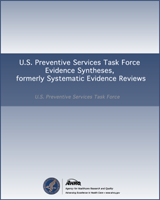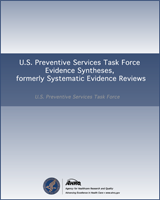Structured Abstract
Context:
Excessive alcohol consumption increases risks for numerous chronic diseases, injuries, disabilities, mortality, and for a host of social and interpersonal problems. Many drinkers who do not meet diagnostic criteria for alcohol use disorders nonetheless consume alcohol at levels or in patterns that increase the risks of negative health and social consequences. Primary health care visits offer opportunities to identify and briefly intervene with these drinkers to reduce their consumption below at-risk levels and patterns.
Objective:
To systematically review evidence for the efficacy of brief behavioral counseling interventions conducted in primary care settings to reduce risky/harmful alcohol consumption or patterns, and to link this evidence to results from other systematic reviews of alcohol screening in primary care populations.
Data Sources:
We searched the Cochrane Database of Systematic Reviews and Database of Research Effectiveness (DARE) (2001, issues 2 and 3; 2002 issue 1), using an inclusive search strategy (alcohol* or drink*) to identify recent, high-quality, English-language systematic reviews of primary care interventions to reduce risky/harmful alcohol use. We searched MEDLINE, Cochrane Controlled Clinical Trials, PsychInfo, HealthSTAR, and CINAHL databases from 1994 through April 2002, using a similarly inclusive search strategy. We also retrieved all recent systematic reviews of screening for alcohol disorders in primary care and all relevant screening and intervention literature reviewed in the 1996 Guide to Clinical Preventive Services or included in other systematic reviews of brief alcohol interventions for risky/harmful use.
Study Selection:
We identified 12 controlled alcohol intervention trials conducted with general adult patients, 3 with pregnant women, and 1 with adolescents that took place in primary care settings and were of good or fair internal validity according to US Preventive Services Task Force (USPSTF) criteria.
Data Extraction:
Data elements were abstracted on standardized forms and included information about the setting, study design, participant inclusion and exclusion criteria, randomization process (if applicable), size and composition of study groups, intervention components (rationale, behavioral techniques, length and number of sessions, provider), follow-up period(s), loss to followup, and alcohol consumption and other outcomes.
Data Synthesis:
Good evidence supports the efficacy of brief, multi-contact primary care interventions for risky/harmful alcohol use in primary care patients identified through screening and screening-related assessment of at-risk drinking and alcohol use disorders. Patients in these trials underwent screening to identify those possibly in need of alcohol misuse intervention in primary care or elsewhere, followed by screening-related clinical assessment to qualify patients appropriate for primary care-based intervention or for referral to specialty treatment of abuse/dependence. Patients were screened generally using standardized self-report instruments alone (e.g., AUDIT), or in combination, (e.g., CAGE with standardized quantity and frequency questions) that have been found to be valid in primary care populations. After primary care brief, multi-contact interventions, patients reduced average drinks per week by 13%–34% and increased the proportion drinking at moderate or safe levels by 10%–19% compared with controls. Similar population-level reductions in average alcohol consumption have been projected to reduce the prevalence of alcohol abuse/dependence by 3%, while use of alcohol within safe/recommended levels has been epidemiologically related to reduced short-term (e.g., injuries, alcohol-related problems) and long-term (e.g., cirrhosis, total mortality) health risks.
Conclusions:
Brief, multi-contact behavioral counseling interventions among adult primary care patients are feasible and potentially highly effective components of an overall public health approach to reducing alcohol misuse. Future research should focus on developing implementation strategies that facilitate the adoption of these practices as a regular part of routine health care. Additional research is needed to develop effective interventions among sub-populations such as pregnant women, ethnic minorities, and adolescents.
Contents
- Preface
- 1. Background
- 2. Methods
- 3. Results
- Key Question 1: Is there direct evidence that behavioral counseling interventions to reduce risky or harmful alcohol use reduce morbidity and/or mortality?
- Key Question 2: What methods were used to identify the target populations for the behavioral counseling interventions?
- Key Question 3: What are adverse effects associated with alcohol use screening and screening-related assessment?
- Key Question 4: Does behavioral counseling intervention in primary care reduce risky or harmful alcohol use in the targeted subgroup?
- Key Question 4a: What are the essential elements of efficacious interventions?
- Key Question 5: Are there other positive outcomes from behavior counseling interventions to reduce risky/harmful alcohol use?
- Key Question 6: What are adverse effects associated with behavioral counseling interventions for risky/harmful alcohol use?
- Key Question 7: What healthcare system influences are present in effective screening, and screening-related assessments and interventions to reduce risky/harmful alcohol use and/or its outcomes?
- 4. Discussion
- 5. Recommendations for Future Research
- Appendix: Tables
- Forms
- Screening Instruments
- More detailed reviews of recent SERs/meta-analyses
- Reference List
Prepared for: Agency for Healthcare Research and Quality, U.S. Department of Health and Human Services.1 Contract No. 290-97-0018, Task Order No. 2. Technical Support of the U.S. Preventive Services Task Force. Prepared by: Oregon Evidence-based Practice Center.2
This report may be used, in whole or in part, as the basis for development of clinical practice guidelines and other quality enhancement tools, or a basis for reimbursement and coverage policies. AHRQ or U.S. Department of Health and Human Services endorsement of such derivative products may not be stated or implied.
AHRQ is the lead Federal agency charged with supporting research designed to improve the quality of health care, reduce its cost, address patient safety and medical errors, and broaden access to essential services. AHRQ sponsors and conducts research that provides evidence-based information on health care outcomes; quality; and cost, use, and access. The information helps health care decisionmakers—patients and clinicians, health system leaders, and policymakers—make more informed decisions and improve the quality of health care services
- 1
540 Gaither Road, Rockville, MD 20850. www
.ahrq.gov - 2
3181 SW Sam Jackson Park Road, Portland, OR 97201.

